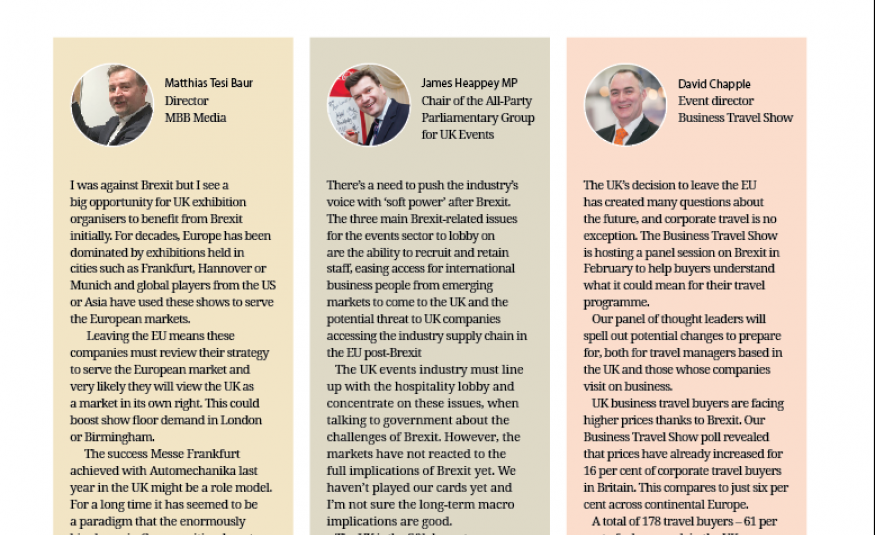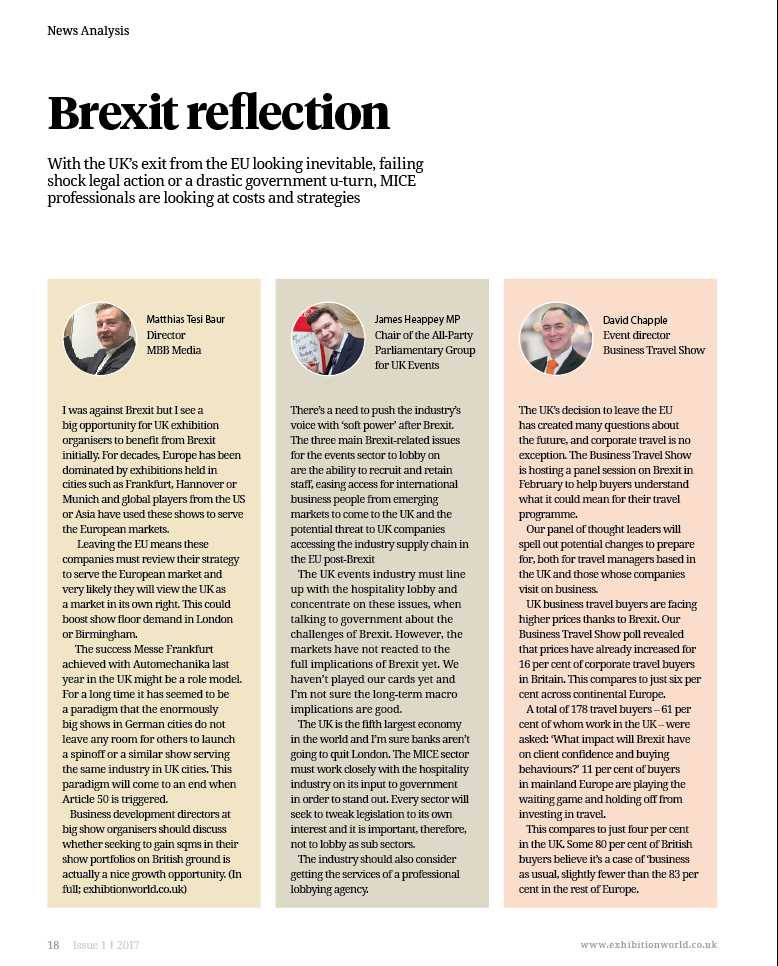With the UK’s exit from the EU looking inevitable, failing shock legal action or a drastic government u-turn, MICE professionals are looking at costs and strategies
Matthias Tesi Baur
Director
MBB Media
Let me serve the current trend of being politically a little bit inappropriate by releasing my personal view on Brexit without being diplomatic about it: I was against Brexit. Firstly, looking back at Europe’s history, our nations have been at war with each other for centuries. It was easy to judge other nations 70 years ago, when we were less integrated. Now we are enjoying the longest period of peace in Europe’s history – for this I feel the European Union is a great organisation. Secondly, I do not understand why somebody would like to give up tax-free access to the single largest consumer market in the world following a leaver-campaign that – well, let’s say – had very interesting interpretation about some facts.
Saying this I must also say that I understand many arguments on the leaver-side as the “pencil-pushers” (don’t worry – I will become politically correct again in a second) in Brussels somehow forgot to give Europe a positive vision in the last 20 years, they were too busy working on tea-bag recycling policies. Because I also understand arguments on the leave side, my hope was that the United Kingdom would stay in the EU and that the referendum would help to shake up our EU institution for better.
However, Article 50 will be triggered very soon. Brexit is reality. And for anyone who does not know what that means, they should simply ask our Prime Minster. They will learn that Brexit means Brexit. I do hope they will make a success out of it. I really do hope the politicians will make a success out of it because at the end of the day and after all the emotions of the Brexit campaign one fact (we return to facts now) remains true: What is good for the UK is good for Europe and vice versa. EU or not EU – we depend on each other. So, I do hope that the UK will come out stronger and both sides can negotiate a deal that makes sense for everybody without an element of mistrust, or even a symbolic punishment which is still demanded by some politicians on the continent.
What could Brexit mean for the exhibition industry? I see a big opportunity that UK exhibition organisers could benefit from Brexit initially. For decades, the European exhibition landscape has been dominated by big exhibitions, mainly in Germany and France. Most global exhibitions have been held in cities such as Frankfurt, Hannover or Munich. For a long time, it has been enough for global players from the US or Asia to serve the European markets by joining flagship shows in these cities. Leaving the EU will mean that these companies must review their strategy to serve the European market and very likely they will view the United Kingdom as a market in its own right. This could boost show floor demand in London or Birmingham. The success Messe Frankfurt achieved with Automechanika last year in the UK might be a role model of what organizers could do. For a very long time it has seemed to be a paradigm that the enormously big shows in German cities do not leave any room for others to launch a spinoff or a similar show serving the same industry in UK cities. This paradigm will come to an end when Article 50 is triggered. Business development directors at the big show organizers should discuss whether seeking to gain square meters in their show portfolios on British ground is actually a nice growth opportunity.
In the end I can’t believe that I, as a “Remainer”, have praised the benefits that might come with Brexit. However, as I said: what is good for the UK is also good for Europe and vice versa. So let’s leave emotions behind and try to make a success out of whatever will come with Brexit.
David Chapple
Event director
Business Travel Show
The UK’s decision to leave the EU has created many questions about the future, and corporate travel is no exception. The Business Travel Show is hosting a panel session on Brexit in February to help buyers understand what it could mean for their travel programme.
Our panel of thought leaders will spell out potential changes to prepare for, both for travel managers based in the UK and those whose companies visit on business.
UK business travel buyers are facing higher prices thanks to Brexit. Our Business Travel Show poll revealed that prices have already increased for 16 per cent of corporate travel buyers in Britain. This compares to just six per cent across continental Europe.
A total of 178 travel buyers – 61 per cent of whom work in the UK – were asked: ‘What impact will Brexit have on client confidence and buying behaviours?’ 11 per cent of buyers in mainland Europe are playing the waiting game and holding off from investing in travel.
This compares to just four per cent in the UK. Some 80 per cent of British buyers believe it’s a case of ‘business as usual, slightly fewer than the 83 per cent in the rest of Europe.
James Heappey MP
Chair of the All-Party Parliamentary Group for UK Events
There’s a need to push the industry’s voice with ‘soft power’ after Brexit. The three main Brexit-related issues for the events sector to lobby on are the ability to recruit and retain staff, easing access for international business people from emerging markets to come to the UK and the potential threat to UK companies accessing the industry supply chain in the EU post-Brexit
The UK events industry must line up with the hospitality lobby and concentrate on these issues, when talking to government about the challenges of Brexit. However, the markets have not reacted to the full implications of Brexit yet. We haven’t played our cards yet and I’m not sure the long-term macro implications are good.
The UK is the fifth largest economy in the world and I’m sure banks aren’t going to quit London. The MICE sector must work closely with the hospitality industry on its input to government in order to stand out. Every sector will seek to tweak legislation to its own interest and it is important, therefore, not to lobby as sub sectors.
The industry should also consider getting the services of a professional lobbying agency.







